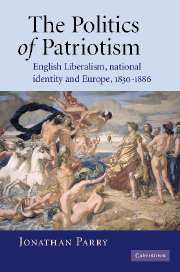Book contents
- Frontmatter
- Contents
- Acknowledgments
- Introduction
- PART I ENGLISH LIBERALISM AND NATIONAL IDENTITY
- PART II EUROPE AND LIBERAL POLITICS
- 3 Liberalism and the Continent, 1830–1847
- 4 The 1848 revolutions and the triumph of liberal patriotism
- 5 Italian unification and the search for an ethical nationhood
- 6 The Franco-Prussian War and the destruction of the first Gladstone government, 1870–1874
- 7 The Eastern question and its consequences, 1875–1886
- Conclusion: Liberalism, state and nation
- Abbreviations and select bibliography
- Index
7 - The Eastern question and its consequences, 1875–1886
Published online by Cambridge University Press: 17 July 2009
- Frontmatter
- Contents
- Acknowledgments
- Introduction
- PART I ENGLISH LIBERALISM AND NATIONAL IDENTITY
- PART II EUROPE AND LIBERAL POLITICS
- 3 Liberalism and the Continent, 1830–1847
- 4 The 1848 revolutions and the triumph of liberal patriotism
- 5 Italian unification and the search for an ethical nationhood
- 6 The Franco-Prussian War and the destruction of the first Gladstone government, 1870–1874
- 7 The Eastern question and its consequences, 1875–1886
- Conclusion: Liberalism, state and nation
- Abbreviations and select bibliography
- Index
Summary
Overseas and Irish affairs dominated British politics in the dozen years after 1874. Between 1875 and 1878, and again in 1882, the Eastern question could not be avoided – the question of the legitimacy of Ottoman rule in the Balkans and Egypt, and the responsibilities of Britain in both of these areas. These debates were strongly influenced by memories of the previous Near Eastern crises of 1840 and 1853. Continuities were also apparent in 1879–80, when the Liberals' attack on Disraeli's foreign and domestic policy, culminating in their victory at the 1880 election, was a restatement of thirty years of constitutional and patriotic argument, against Disraeli's ‘imperialism’, his apparent rejection of English political values.
The use of this word did not, however, mean that Liberals were hostile to the global assertion of British power. Many of them, conscious of the bad publicity given to non-intervention in the previous ten years, took advantage of the emphasis on foreign policy after 1875 to create a more uplifting overseas agenda for the party. They sought to combine patriotism with a vigorous defence of constitutional and Christian principles, in order to rally the party, to educate the electorate, and to recover a reputation for world leadership on Liberal terms. They saw this as a counter-strategy to Disraeli's confused and artificial attempt at national aggrandisement.
Then, after 1880, Liberal government was very concerned to uphold the duties and status of England against any threat that might emerge – and several did emerge in the 1880s.
- Type
- Chapter
- Information
- The Politics of PatriotismEnglish Liberalism, National Identity and Europe, 1830–1886, pp. 323 - 386Publisher: Cambridge University PressPrint publication year: 2006
- 1
- Cited by



